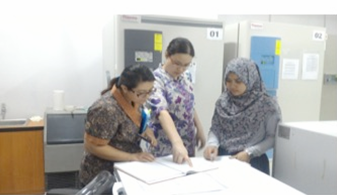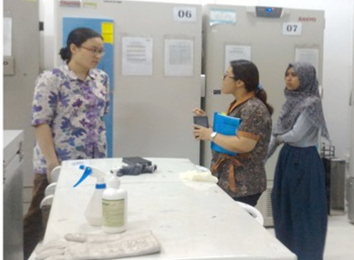|
PARTNERSHIPS FOR ENHANCED ENGAGEMENT IN RESEARCH (PEER) HEALTH
Cycle 1
High-dose Rifampicin for the Treatment of Tuberculous Meningitis: a Dose-‐Finding Study (ReDEFINe: Rifampicin DosE FINding Study) Principal Investigator: Rovina Ruslami, Universitas Padjadjaran NIH-Supported Collaborator: H. Clifford Lane, NIH intramural researcher Title of NIH Award: INA-RESPOND (Indonesian Research Partnership in Infectious Disease) Project Dates: October 2013 - October 2017
Project Overview:
TB meningitis (TBM) is the most severe manifestation of TB, leaving up to 50% of patients dead or neurologically disabled. Current treatment is similar to treatment of lung TB, although penetration of some antibiotics into the brain is poor and the immune-pathology of TB meningitis is very different from pulmonary TB. Current treatment regimens are not based on clinical trials. Rifampicin is a key drug for TBM, but its penetration into the brain is limited, suggesting that a higher dose may be more effective. There are several highly relevant, outstanding questions related to the appropriate dose of rifampicin for TBM, before a multicenter phase III trial can be performed. The overall aim is to establish the optimal dose of rifampicin for TBM, which can be evaluated in a follow-‐up multicenter phase III RCT. The primary objective is to generate pharmacokinetic (PK) data for higher doses of rifampcin patients with TBM. This will be a double-blinded, 1:1:1 randomized, placebo controlled, phase IIb trial. Roughly 60 adult TBM patients will be randomized to one of three arms consisting of varying doses of rifampicin administered orally, as part of a standard 4 drug regimen for TBM. Pharmacokinetics data, safety/tolerability and efficacy data will be collected. Subjects will be followed for 180 days. Finding the right dose of rifampcin could alter the standard of care and reduce mortality and morbidity of this important, and difficult to treat, disease.  |  | | | |
Final Summary of Project Activities Initially, this PEER project aimed to conduct an explorative pharmacokinetic (PK) study, examining three different oral doses of rifampicin (450 mg, 900 mg, and 1350 mg) in TB meningitis patients. The result of this study was to be a validation of an improved treatment regimen for TB meningitis to overcome bad outcomes associated with the disease. The team also aimed to strengthen microbiological diagnosis of TB meningitis cases by performing various confirmation techniques including enhanced staining (cytospin), culture, and PCR-based (GeneXpert and in-house PCR) techniques. The team modified the objectives in the second year of the project focus on three objectives in the third year. The summary of the project results are as follow: - Tripling the dose of rifampicin increases exposure both in blood and CSF, increases PK target attainment, and does not increase Grade 3 and 4 toxicity. There is a trend that a Rifampicin 30 mg/kg dose improves survival.
- An important measure to achieve high confirmatory bacteriological result is to obtain large volume of CSF (more than 7 mL).
- PCR yields more positive confirmation than other modalities. The cytospin method does not significantly improve bacteriological confirmation in TB meningitis patients in Indonesia.
- PK of INH in plasma of TB meningitis equals to that in pulmonary TB, with good penetration of INH to CSF. With 50% of Indonesian population being fast acetylators, there might be association between acetylator status and mortality.
Overall impacts of the research: - The results of the bacteriological confirmation has led the team to promote the use of GeneXpert and/or in-house PCR. The benefit of using cytospin was analyzed using data from three different countries.
- The result of the PK study using a higher dose of Rifampicin has encouraged physicians to use a higher than recommended dose of Rifampicin to treat TB meningitis patients. The Indonesian health policy maker also has approved the administration of higher dose of Rifampicin for extrapulmonary TB, especially TB meningitis.
- A multicenter, phase 3 trial for the higher dose of Rifampicin was discussed and the plan has been initiated by submitting a proposal to the MRC, UK, and possibly will be funded by NIH/NIAID.
- Data on PK of INH in plasma and CSF is also being used to design clinical trial using higher dose of INH.
PublicationsClinical Parameters, Routine Inflammatory Markers, and LTA4H Genotype as Predictors of Mortality Among 608 Patients With Tuberculous Meningitis in Indonesia. The Journal of Infectious Diseases, 2017 Apr 1;215(7):1029-1039. DOI: https://doi.org/10.1093/infdis/jix051
Health Cycle 1 Recipients
| 




